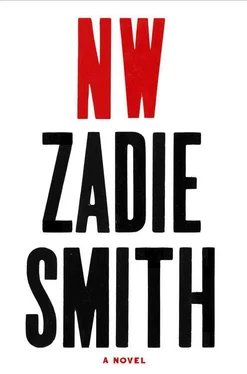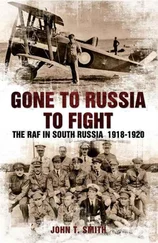“No,” said Naomi De Angelis.
Natalie wiped the cold sweat from her forehead with her scarf and looked up to see if anyone was admiring her maternal calm in the face of such impossible provocation. The woman in front of her in the queue came into view. She was emptying her pockets onto the counter, offering to relinquish this and that item. Her children, four of them, cringed around her legs.
Natalie Blake had completely forgotten what it was like to be poor. It was a language she’d stopped being able to speak, or even to understand.
169. Lunch with Layla
Her old friend Layla Thompson was now Layla Dean. She’d left the church many years earlier. She worked at a Black and Asian radio station as the head of music programming. She was married to a man who owned and ran two internet café/copy shops in Harlesden. Damien. Three children. Whenever Natalie Blake was having an argument about education (she had arguments of this kind constantly) she held up her old friend Layla as a positive example of all that she was trying to say.
When using Layla as a positive example in this manner she usually neglected to mention that she had not seen Layla for a couple of years. Layla had been having her children and Natalie had not been having children and during this period Natalie had found it difficult to have lunch with Layla, Layla’s concerns seeming so myopic, so narrowly focused. Now that Natalie had children of her own it occurred to her that she would really love to have regular lunches with Layla once again. There were so many things she would be able say to Layla that she had not been able to say to anyone else. Lunch was arranged. And now she found herself speaking very fast and fully availing herself of Layla’s hospitality at this beautiful soul food restaurant in Camden High Street. There was a sense in which she couldn’t speak fast enough to get out all the things she wanted to say.
“‘ It’s such a relief not to have to pretend to be interested in the news,’” said Natalie Blake, quoting another woman, and eating a small china ladle full of prawns in coconut milk broth. “And I just sat in a circle of these freaks and thought: I really don’t belong here. Show me the exit. I need people I can go out dancing with.” Outside, a car passed playing “Billie Jean.”
“I’ll come dancing with you, Natalie.”
“Thank you! There’s an old school hip-hop night in Farringdon somewhere, my brother told me about it. We could go next Saturday. I could get my friend Ameeta on board. Beats singing Old Macdonald.”
“I like those kid classes. I used to go all the time.”
“Not this one. This one’s posh. But the bit I really can’t deal with is when they all—” began Natalie and continued in this vein through most of the main course. Men came with punch, they came with punch. Her glass was never half empty or half filled but always filling. Men came with punch. Outside, a car passed playing “Don’t Stop ’Til You Get Enough.”
“What?” asked Natalie Blake. She was really too drunk to return to chambers. Her friend Layla was smiling, a little sadly. She was looking at the tablecloth.
“Nothing. You’re exactly the same.”
Natalie was in the middle of texting Melanie to warn her she would not be in now until tomorrow morning.
“Right. It’s not like I have to become another person just because—”
“You always wanted to make it clear you weren’t like the rest of us. You’re still doing it.”
A waiter came over to ask about dessert. Natalie Blake, though eager for dessert, felt now she could not really order one. She was struck with dread. Her heart beat madly. She had a schoolgirl’s impulse to report Layla Dean née Thompson to the waiter. Layla’s being horrible to me! Layla hates me! Outside, a car passed playing “Wanna Be Startin’ Somethin’.”
Layla did not look up at the waiter and after a moment he went away. She had a thick white napkin she was twisting in both hands.
“Even when we used to do those songs you’d be with me but also totally not with me. Showing off. False. Fake. Signaling to the boys in the audience, or whatever.”
“Layla, what are you talking about?”
“And you’re still doing it.”
170. In drag
Daughter drag. Sister drag. Mother drag. Wife drag. Court drag. Rich drag. Poor drag. British drag. Jamaican drag. Each required a different wardrobe. But when considering these various attitudes she struggled to think what would be the most authentic, or perhaps the least inauthentic.
171. Me, myself and I
Natalie put Naomi in her car-seat and locked the buckle. Natalie put Spike in his car-seat and locked the buckle. Natalie climbed up into the giant car. Natalie closed all the windows. Natalie put on the air conditioning. Natalie put Reasonable Doubt in the stereo. Natalie instructed Frank to mute egregious profanity as and when it arrived.
172. Box sets
Walking down Kilburn High Road Natalie Blake had a strong desire to slip into the lives of other people. It was hard to see how this desire could be practicably satisfied or what, if anything, it really meant. “Slip into” is an imprecise thought. Follow the Somali kid home? Sit with the old Russian lady at the bus-stop outside Poundland? Join the Ukrainian gangster at his table at the cake shop? A local tip: the bus stop outside Kilburn’s Poundland is the site of many of the more engaging conversations to be heard in the city of London. You’re welcome.
Listening was not enough. Natalie Blake wanted to know people. To be intimately involved with them.
Meanwhile:
Everyone in both Natalie’s workplace and Frank’s was intimately involved with the lives of a group of African-Americans, mostly male, who slung twenty-dollar vials of crack in the scrub between a concatenation of terribly designed tower blocks in a depressed and forgotten city with one of the highest murder rates in the United States. That everyone should be so intimately involved in the lives of these young men annoyed Frank, though he could not really put his finger on why, and in protest he exempted himself and his wife from what was by all accounts an ecstatic communal televisual experience.
Meanwhile:
Natalie Blake checked her listing. Replied to her replies.
173. In the playground
You can’t smoke in a playground. It’s obvious. Any half-civilized person ought to know that.
Yes, agreed Natalie. Yes, of course.
Is he still smoking? Asked the old white lady.
Natalie leaned forward on the bench. He was still smoking. About eighteen years old. He was with two other kids: a white boy with terrible acne and a very pretty girl in a gray tracksuit and neon yellow Nikes. The girl was doing what Natalie and her friends used to call “lounging” or “plotting,” i.e., she sat between the white boy’s legs with her elbows on his knees in a lazy summertime embrace. And they looked quite nice together, lounging on the roundabout. But it could not be denied: the smoking boy was standing on the roundabout. Smoking.
I’m going to give them all a piece of my mind. Said the old white lady. They’re all off that bloody estate.
The old lady went over and at the same moment Naomi ran from the paddling pool into her mother’s arms crying TOWEL TOWEL TOWEL. In case you were wondering, this was indeed the same pool in which the dramatic event had occurred, many years earlier. Natalie Blake wrapped a towel around her daughter and put plastic sandals on her feet.
The old lady returned.
Is he still smoking? He was very rude to me.
Yes. Said Natalie Blake. Still smoking.
PUT IT OUT. Shouted the old lady.
Natalie picked Naomi up in her arms and walked over to the roundabout. As she approached, a middle-aged woman, a formidable-looking Rasta in a giant Zulu hat, joined her. The two of them stood by the roundabout. The Rasta folded her arms across her chest.
Читать дальше











